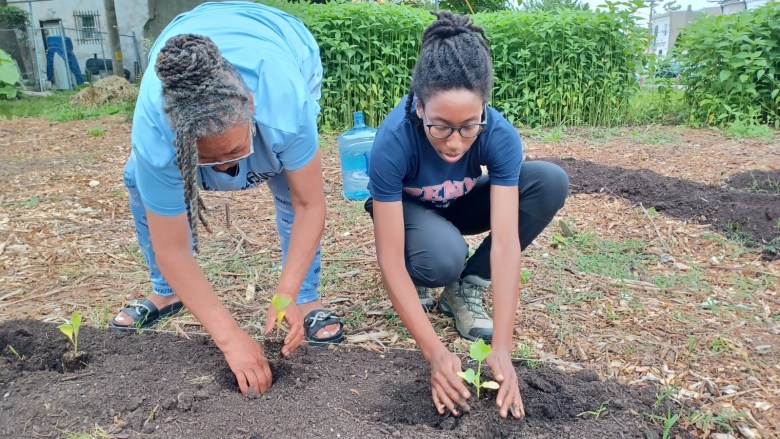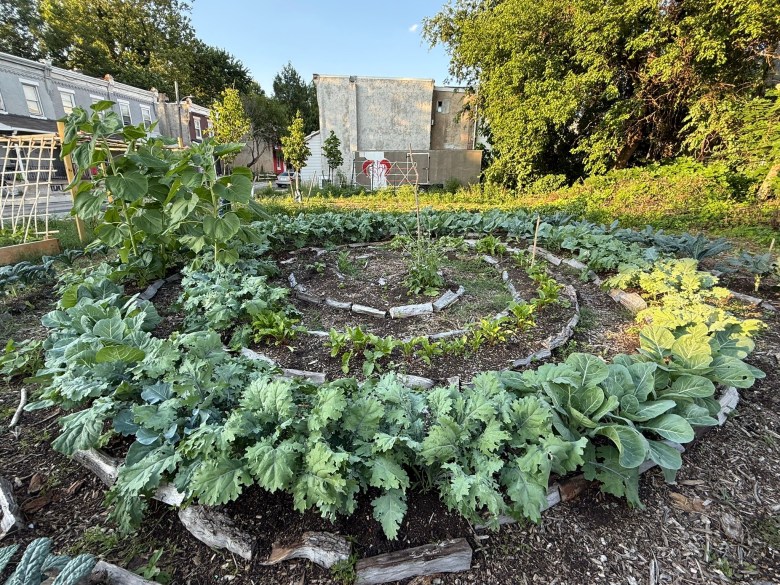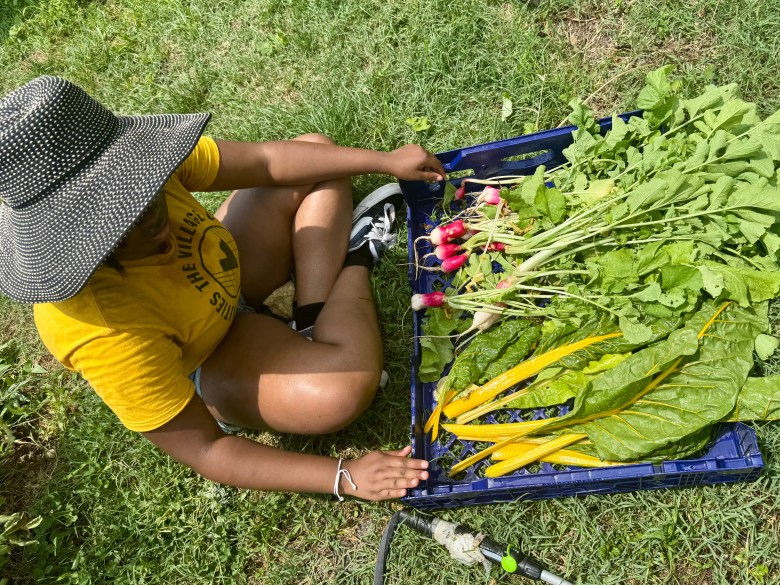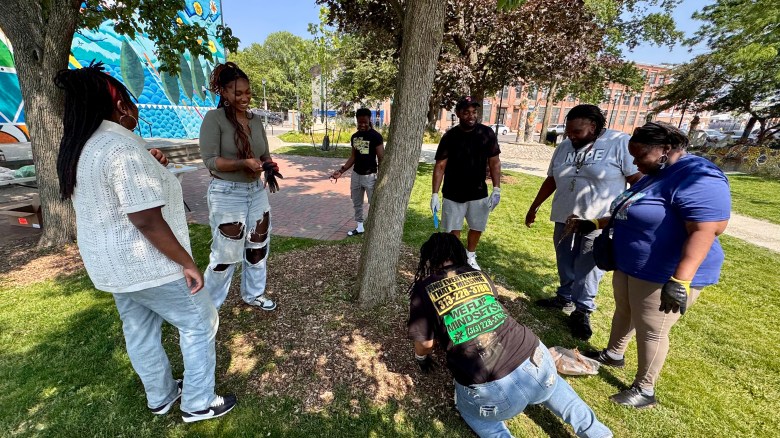Philadelphia often wears its grit like a badge of honor. However, two weeks after the city’s municipal workers strike, which was punctuated by overflowing trash dumpsters, the need for clean, green community spaces – especially in the summer heat – feels more urgent than ever.
That’s where community gardens come in.
Garden spaces in Philadelphia are usually neighborhood driven and often start on one of the city’s 40,000 empty and forgotten lots.
“Philadelphia has a lot of vacant, abandoned land, some of which is privately owned, some of which is owned by the city,” explained Mimi McKenzie, legal director of the Public Interest Law Center. “It’s collecting debris and trash and rodents. And the neighbors roll up their sleeves and put in their own blood, sweat and tears to clear the land of debris and to bring in soil, to test the soil, to make sure it’s safe.”
 (Courtesy of Ben Corn Miller)
(Courtesy of Ben Corn Miller)
McKenzie works to protect green spaces in the city, and help grant farmers and gardeners legal ownership of their space.
“Neighbors all around the city have been stewarding and gardening this land,” she said. “They make huge investments up front and then have been taking care of this land for many, many years. And all of us benefit.”
One of those stewards is Ben Corn Miller. Miller is a chef and co-founder of South Philly Barbacoa, The People’s Kitchen and a lead organizer behind the Reinhard Street Community Farm in South and Southwest Philadelphia.
Miller’s middle name isn’t actually “corn,” but he added it because as a tortilla enthusiast he’s obsessed with growing the grain. Plus, he liked the pun “Corn Miller” created. “If I get some extra money someday, I’ll change my name legally,” he said. “But right now, it’s just for fun.”
Like McKenzie, Miller has noticed Philadelphians using vacant lots as trash dumping zones.
“Being up there since 2006, I’ve seen all kinds of stuff dropped off up there,” he said. “I’ve seen abandoned cars. I’ve seen animal carcasses, bags of trash, old furniture, you name it. And I think that has a tangible effect on neighbors that live there. Their children play there. They walk their dogs there.”
 (Courtesy of Ben Corn Miller)
(Courtesy of Ben Corn Miller)
“Like with the trash, they all kind of go together — the drug dealing, the delinquency, the bullshit, it causes depression,” he added. “And I feel like putting love into the land and making it look beautiful, and taking the steps to regenerate it and bring the community together, it’s got so many amazing, positive benefits.”
Multiple studies have shown that cultivating vacant lots into gardens yields benefits beyond simply removing a neighborhood blight — including improved health outcomes, cooler temperatures to mitigate the urban heat island effect, and a significant reduction in the amount of gun violence, crime and fear a community experiences.
Not only this, but community gardens like Reinhard, which grow nutritious food, help feed food-insecure Philadelphians.
 (Courtesy of Ben Corn Miller)
(Courtesy of Ben Corn Miller)
“We can’t always rely on the government to take care of us,” Miller said. “We have to take care of ourselves and our own communities, and that’s why we’re doing this.”Lu Thain, the director of land and environmental initiatives at The Village of Arts and Humanities’ Philly Earth Farm & Orchard, echoed this sentiment — especially in light of recent SNAP cuts. Her organization is helping feed her community in Fairhill–Hartranft, which she refers to as a food desert.
“We’re very heavily geared towards the youth and youth education,” Thain said. “Once a week, we do some type of culinary arts demo for them. So we’re doing a lot of cooking and processing with what we grow.”
Taking control through gardening
For Thain, expanding green spaces in the city is essential amid what often feels like a sea of concrete.
“Humans’ connection to the land is severely broken,” Thain said. “When people can actually connect to the earth and be around big trees … I think that there’s actually something that happens in their body that causes a sort of regulation. A lot of people can’t put that into words, but they feel it.”
 Philly Earth Farm & Orchard has three different food-producing green spaces. (Courtesy of Lu Thain)
Philly Earth Farm & Orchard has three different food-producing green spaces. (Courtesy of Lu Thain)
Erecting a new garden is similar in ways to creating a new mural in the city. It provides purpose to a space and makes it beautiful.
“The Village does also have a lot of really beautiful murals and also sculptural arts,” Thain said. “We call them art parks, but our green spaces are really something profound because of people’s response to them, especially in our neighborhood.”
What’s more, when people see that a place has been cared for and loved, they’re less likely to disrespect it.
Thain said that for beginners, starting at home can be the first step into getting involved in a greater project.
“Sometimes we just give out plant starts and kind of teach people the basics of gardening so that they can go do it at home,” Thain said. “And it’s really about that empowerment and getting people to realize that they need to have control over their own food source.”
Ways to participate
Community gardens start as a seed of an idea, before they’re ready to grow into something bigger. Anyone who wishes that they had more green spaces on their block may need to consider taking matters into their own hands. Often a transformation for a vacant lot begins from the bottom up.
“Pick the one that’s next to your house, one that you can oversee,” Miller advised. “People can think about, what’s the ownership status of the lot? Is there a fire hydrant nearby where they could get water? And then having those conversations in community with all the neighbors that surround those lots to make sure that they’re on board.”
 Volunteers tend a community garden space cultivated by the Village of Arts and Humanities’ Philly Earth Farm & Orchard. (Courtesy of Lu Thain)
Volunteers tend a community garden space cultivated by the Village of Arts and Humanities’ Philly Earth Farm & Orchard. (Courtesy of Lu Thain)
Creating a new green space is not easy. In many ways it’s a leap of faith. It takes time and investment, and because many spaces are in a somewhat legal gray zone of ownership, there is no guarantee that a garden will stay a garden.
Still, Miller has a few tips for how to create a new garden. He explained that vacant lots often result when a building is demolished, leaving behind rubble like old bricks in the basement, which the city then covers with a layer of topsoil.
“My technique is permaculture,” he said. “Build layers and layers and layers and layers on top of it, right? I know an arborist in West Philly, and we’ll get dump after dump of wood chip mulch. He cuts down trees, they mulch them up. He needs a place to dump them … So he just dumps it on our spot.”
After a month, that soil compacts and the process repeats.
“Then we mound up the compost,” he said. “We bring in nice compost from the organic recycling center.” Eventually, the soil becomes rich enough to support plants.
“There are a lot of things to think about when gardening on vacant land,” said Adam Hill, director of community gardens at The Pennsylvania Horticultural Society in an email.
PHS supports a network of 190 independently run community gardens in the city, and has a map of neighborhood gardens to get involved with.
“If you have a garden or are planning on starting one, know that it is extremely rewarding and has incredible benefits to you and your neighborhood,” Hill said. “However, it can also be very difficult and time-consuming in terms of the actual gardening, but also from the land access, water access and community-organizing perspective.”
Creating a completely new space isn’t the only way to get involved.
 Tree canopies provide cool, shaded spaces during summer heat waves. (Courtesy of Lu Thain)
Tree canopies provide cool, shaded spaces during summer heat waves. (Courtesy of Lu Thain)
The Public Interest Law Center holds Vacant Land 215 sessions on gardening vacant lots. Hill is presenting in August on the topic along with representatives from the Public Interest Law Center, Neighborhood Gardens Trust and USDA Urban Ag Service Center. PHS’s Garden Tender series also provides tips and tricks for budding green thumbs to check out.
What’s more, organizations like Philly Earth Farm & Orchard and the Reinhard Street Community Farm accept volunteers, and have programs people can get involved in.
“I’ve been in Philly for 20 years, and I love it,” Miller said. “[The city] has a lot of special people, with a lot of revolutionary spirit, who come up with creative ways to collectively deal with the struggle in situations that we have.”
“Sometimes,” he added, “we have to do it for ourselves.”

